
March 14, 2014, by Lindsay Brooke
‘Is Ukraine governable? Redux’
Adam Swain, an expert in post-soviet Europe in the School of Geography has just returned from Ukraine. With just two days to go before the Crimean referendum he revisits the question he posed in his previous blog.
Just over three weeks ago I posed the question as to whether Ukraine was governable. At the time thousands of anti-government protestors in central Kyiv were radicalising as neo-fascist activists, supported by a broader movement, fought a battle with the government’s Berkut riot police. Around 100 people on both sides of the barricades were killed. It appears likely that some of the killings were at the hands of snipers allied with the protestors who targeted protagonists on both sides to energise the protestors and undermine the authorities.
Beyond Kyiv, in west and central Ukraine, anti-government protestors occupied government buildings.
President Yanykovych lost control over much of the country and fled Kyiv resulting in the election by the parliament of an interim president and a new government. Whilst there was a groundswell of genuine anti-government opposition within Ukraine it is also the case that western countries ‘midwifed’ – to use the now infamous term of Victoria Nuland (the US Assistant Secretary of State for European and Eurasian Affairs) – the violent overthrow of a democratically elected president. Over the years when pro-Russian politicians have occupied the corridors of power in Kyiv the west has sought to destabilise the country. The west wishes a subservient Ukraine and in the absence of that would prefer to see chaos rather than a country subservient to Russia.
Three weeks later and we now see a mirror image. On the one hand there is genuine popular opinion in the east and south of the country which regards the new authorities as illegitimate and would like Ukraine to have some form of closer relationship with Russia. On the other hand, now that pro-Western politicians occupy the presidential administration building and the ministries in Kyiv, Russia is seeking to destabilise the country. Russia wishes to see a subservient Ukraine and in the absence of that would prefer to see chaos rather than a country subservient to the west.
On Sunday a hastily organised referendum will take place in the Autonomous Republic of Crimea which is likely to see the status of the region change. Even in normal circumstances it would be likely that at most a small majority would vote to reunite with Russia. In the referendum on Ukrainian independence in 1991 only about 54% voted in favour. Also in a recent opinion poll by the Democratic Initiatives Foundation and the Kyiv International Institute of Sociology conducted before the change in authorities, 41% in in the region wanted to reunite with Russia. The polarising effect of the uprising in Kyiv is likely to have increased that number. However, with Russia having effectively occupied Crimea, albeit without firing a shot in anger, these are not normal times. The referendum only permits voters to choose between joining Russia and seceding from Ukraine, voters wishing to retain the status quo ante will not have the opportunity to register their opinion. All this means that despite the hard-line western response Crimea has effectively already been lost by Ukraine.
The future of the remainder of Ukraine will be decided in the Russian speaking east of Ukraine. Russian troops are reported to have massed on the border and to be engaging in training manoeuvres. Following a series of tense standoffs between pro-unity and pro-Russian protestors in the eastern city of Donetsk during the last two weeks the first fatality occurred on Thursday night. Early reports suggested that a pro-Russian protestor had stabbed a pro-unity protestor in the city’s main Lenin square. In the opinion poll referred to above, 33% of respondents in Donetsk region indicated a preference for unity with Russia. However, a far larger proportion of the population is likely to support federalisation within Ukraine. Pro-unity supporters would contend that federalisation would be a precursor to further fragmentation of the country.
Blogpost by Adam Swain, School of Geography, University of Nottingham, 1200 GMT, 14 March 2014
Pictures courtesy of Adam Swain.
- Spontaneous pro-unity rally outside the Russian Orthodox cathedral in Donetsk 4 March 2014
- Spontaneous pro-unity rally outside the Russian Orthodox cathedral in Donetsk 4 March 2014
- Spontaneous pro-unity rally outside the Russian Orthodox cathedral in Donetsk 4 March 2014
- Spontaneous pro-unity rally outside the Russian Orthodox cathedral in Donetsk 4 March 2014
- Spontaneous pro-unity rally outside the Russian Orthodox cathedral in Donetsk 4 March 2014
No comments yet, fill out a comment to be the first

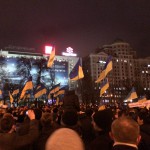
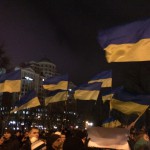
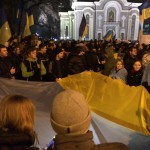
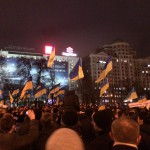
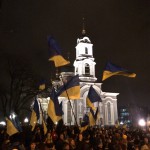
Leave a Reply